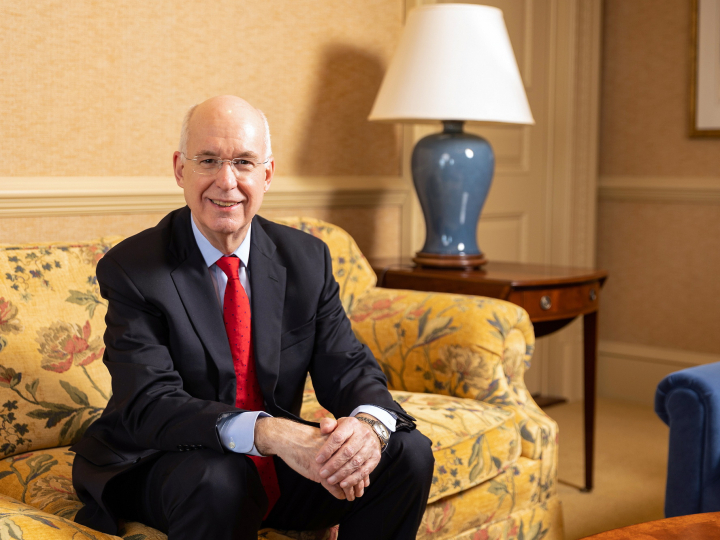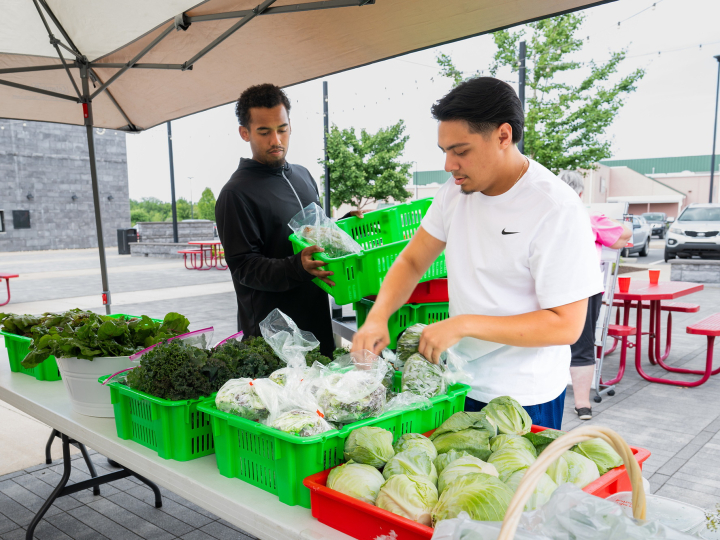Bucknell Answers: Leading in the Wild
September 15, 2015
Outdoor Education & Leadership Director Tony Stafford explains why learning outside the classroom can build the skills students will need in the workplace.
Q: What does Outdoor Education teach students about leadership?
A: We do a lot things that help students enhance their leadership skills through the outdoor program. First and foremost, our BuckWild wilderness pre-orientation experience is a way for first-year students to gain a leadership opportunity before they begin their campus experience. The upperclass student leaders have created a soft‑skills curriculum to help students be safe in the backcountry, to allow them to take ownership of their own experience. They become leaders within the program by leading their own group. They learn to navigate. They work together as teams. They problem‑solve. The group comes in as a bunch of individuals, but they leave as a team, a family — focused and ready to take on their first year at Bucknell.
Q: Do they need outdoor experience to participate?
A: They do not need to have outdoor experience to be a part of the program. The outdoors is just a catalyst to create learning. It's challenging. Mother Nature teaches you from your mistakes immediately — if you forget to put on rain gear or you're not feeding yourself well, you'll typically find out shortly thereafter that you're not doing the things you need to take care of yourself if it begins to rain or you feel ill.
Q: How can students get involved in outdoor education?
A: We have BuckWild; we have an indoor climbing wall, the CLIMBucknell challenge course, Bison Bikes, Rental Center, Affinity Housing, trips on weekends and breaks and Outing Club. We also take students on international learning adventures, backpacker-style. In the past we traveled to Costa Rica to work on an organic farming project, learn some Spanish, participate in a two‑day whitewater rafting trip, hike to a local village and explore national parks and the beach while bike cruising. There are also opportunities to snorkel and canyoneer with ziplining down waterfalls. That experience is immersive. Students use the native language to find local bus travel and hostels to stay in. They're actually using guidebooks, setting a budget, deciding where the group will stay. They're learning all these skills as they go. We also run domestic trips. We've done an eight-day backpacking trip in the Grand Canyon and we've gone to the Everglades National Park and done eight days of canoeing, which was fantastic. Our student leaders actually pick these trips and they help lead them. They're qualified through our BuckWild leadership training program and do so with the professional staff's guidance and help.
Q: What makes Bucknell's Outdoor Education program successful?
A: It's driven by students and their ideas. If a student says, "I want to do this," I respond with, "Well, make it happen." Students hear "no" a lot. I'm not a "no" person. I say, "If you want to do it and you've got the drive, then let's figure out how we can make it happen." We want the students to feel like they are leaving their legacy at Bucknell. We have a leadership team of about 15 student managers, including the Outing Club and Affinity Housing leaders. We give them the foundation and they build the structure upon it.
Q: What makes Central Pennsylvania a great place for outdoor education?
A: Central Pennsylvania has just about everything you would ever want to try to do and explore. Just here in the Lewisburg area, we have a rail-to-trail. We've got the Susquehanna River right on campus, where students can paddle, canoe, kayak and tube. There's great hiking here and winter pursuits like snowshoeing, cross‑country skiing, ice climbing. You can get into some more technical mountaineering up in the Northeast, as well. Our students are definitely getting out. They're hiking, rock‑climbing, caving. They're mountain biking and doing a lot of water sports. We have all the equipment here on campus to be able to get you outside to explore these amazing areas. Nearby we've got Ricketts Glen about 45 minutes away, where there are 23 waterfalls within a three-mile-loop hike. We've got the Golden Eagle Trail, which is about an hour and 15 minutes away. It's one of the best nine-mile hikes in the country. Pennsylvania is a beautiful place to get outside.
Q: Why should students get involved with outdoor education?
A: They learn risk management and communication skills. They learn how to develop teams, how to bring groups of people together. Outdoor Education and Leadership does a really good job of creating a tight‑knit community of people who care about each other. We want to make change and be positive influences on campus and beyond. Also, with all the stress of studies and projects, the outdoors provides a sanctuary and improves mental health. People can sit, relax, gain new perspective. It helps them recharge their battery as they move on to the next challenge in their life. They also have the ability to disconnect from technology and to connect with each other. They can plan activities and events for the campus. Overall, it is a great program that supplements other leadership opportunities provided on campus.

